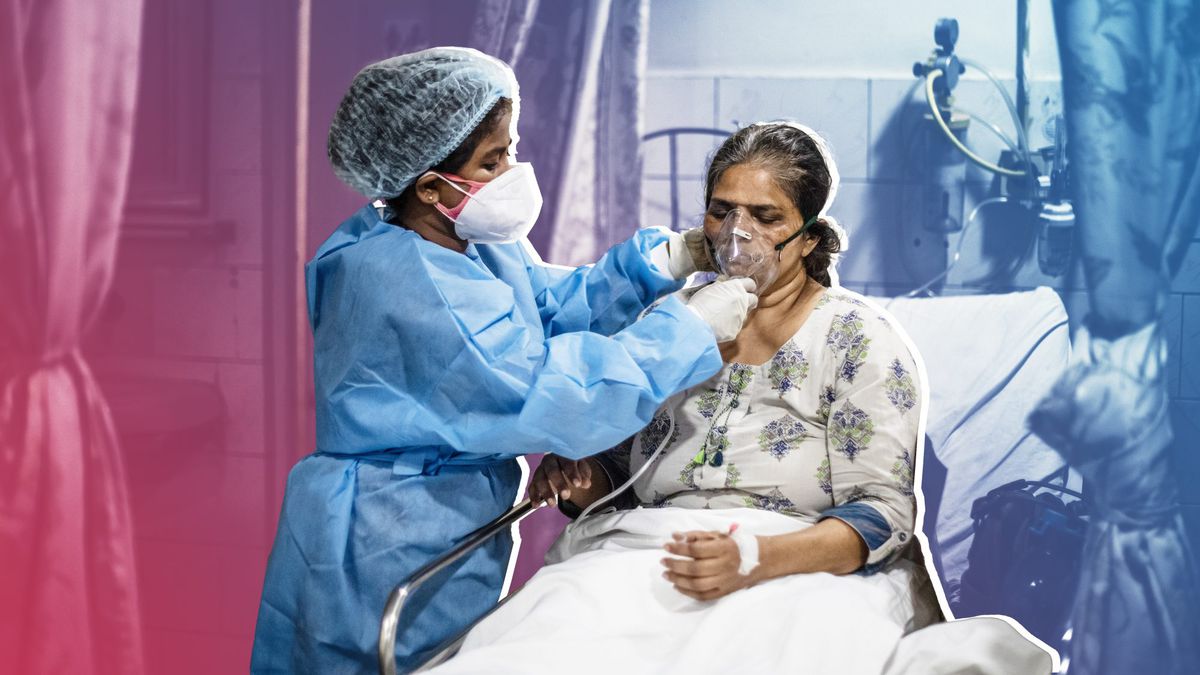India is experiencing a devastating COVID-19 surge, with health officials in the country reporting 366,161 new infections on Monday and 3,754 deaths. Now, the country is seeing a rise in another potentially deadly illness.
It's a fungal infection called mucormycosis, aka "black fungus." The Times of India says the western state of Maharashtra, which has seen a massive surge in COVID-19 cases, has seen around 200 patients who had recovered from COVID-19 and contracted mucormycosis. Eight have died.
The Indian Council of Medical Research (ICMR) has issued an advisory, saying that the infection "if uncared for, may turn fatal."
You've probably never even heard of mucormycosis before, but doctors say it can and does happen in the US—it's just rare. Here's what you need to know.
First, what is mucormycosis?
Mucormycosis is a serious but rare fungal infection caused by a group of molds called mucormycetes, according to the Centers for Disease Control and Prevention (CDC). "The fungus that causes it is in the environment everywhere you look," infectious disease expert Amesh A. Adalja, MD, senior scholar at the Johns Hopkins Center for Health Security, tells Health.
But while the molds that cause the fungal infection are in the environment, it mainly affects people who have serious health problems or who take immunosuppressant medications, the CDC says.
People usually develop mucormycosis after breathing in the fungal spores from the air, which then get into their sinuses and lungs, Thomas Russo, MD, professor and chief of infectious disease at the University at Buffalo in New York, tells Health. However, it's also possible to get it through the skin after having a cut, burn, or other injury, Cindy Wassef, MD, assistant professor at the Rutgers Center for Dermatology, tells Health. "The fungi that cause mucormycosis are often found in soil or rotting vegetables, fruits, and bread," she says.
In general, mucormycosis isn't a common infection. "Infectious disease doctors are familiar with it, but it is rare, fortunately," William Schaffner, MD, an infectious disease specialist and professor at the Vanderbilt University School of Medicine, tells Health. In the US, for example, the CDC says it often investigates one to three cases of clusters of mucormycosis linked to certain groups of people, like those who have had an organ transplant.
Why are mucormycosis cases increasing in India right now?
There does seem to be a COVID-19 connection. People are most at risk of contracting mucormycosis when they're immunosuppressed, and that can include after having a serious illness like COVID-19, Dr. Adalja says. "We see it sometimes after severe influenza," he adds.
People with more severe forms of COVID-19 are treated with steroid medications, which can also suppress the immune system, opening them up to a fungal infection like mucormycosis, Dr. Russo points out. "That, and severe COVID-19 infections in and of itself might suppress the immune system even further," he says.
What are symptoms of mucormycosis?
Symptoms can vary depending on where someone is infected, the CDC says.
If a person's sinus and brain is infected, they may experience the following symptoms:
- One-sided facial swelling
- Headache
- Nasal or sinus congestion
- Black lesions on nasal bridge or upper inside of mouth that quickly become more severe
- Fever
Symptoms in the lungs can include:
- Fever
- Cough
- Chest pain
- Shortness of breath
A skin infection may have these symptoms:
- Blisters
- A black infected area
- Pain
- Warmth
- Excessive redness
- Swelling around a wound
Symptoms of mucormycosis in the gastrointestinal tract can include:
- Abdominal pain
- Nausea and vomiting
- Gastrointestinal bleeding
How is mucormycosis treated?
The condition is treated with antifungal medications, usually amphotericin B, posaconazole, or isavuconazole, per the CDC, if you want specifics. They're often given through an IV or by mouth. "A patient may also need surgery to cut out infected tissue," Dr. Russo says.
While this infection is currently on the uptick in India, not the US, doctors stress that mucormycosis is a serious illness. "It's a nasty infection and can be very devastating if it is not detected early and treated," Dr. Schaffner says.
The information in this story is accurate as of press time. However, as the situation surrounding COVID-19 continues to evolve, it's possible that some data have changed since publication. While Health is trying to keep our stories as up-to-date as possible, we also encourage readers to stay informed on news and recommendations for their own communities by using the CDC, WHO, and their local public health department as resources.
To get our top stories delivered to your inbox, sign up for the Healthy Living newsletter
Source: Read Full Article

